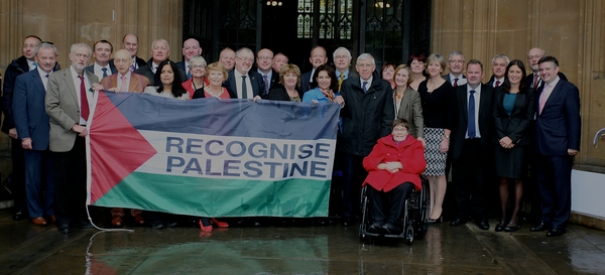Palestine State Recognition
 Recognising Palestine is to recognise Palestinian right to self-determination. Palestine has acquired the attributes of a state and is ready for statehood. Its borders are subject to negotiation as are Israel’s. Israel should have zero right of veto over another people’s right to self-determination. The former British Consul-General in Jerusalem, Sir Vincent Fean, has written a very clear Op-ed in the Daily Telegraph outlining the case for British recognition now.
Recognising Palestine is to recognise Palestinian right to self-determination. Palestine has acquired the attributes of a state and is ready for statehood. Its borders are subject to negotiation as are Israel’s. Israel should have zero right of veto over another people’s right to self-determination. The former British Consul-General in Jerusalem, Sir Vincent Fean, has written a very clear Op-ed in the Daily Telegraph outlining the case for British recognition now.
It is a policy decision for our Government, which rightly recognises states, not governments. 134 out of 193 UN member states have recognised Palestine and Pope Francis addressed President Abbas as the Head of State of Palestine during his Holy Land pilgrimage in May. Russia and China, two of the five permanent members of the Security Council, have both recognised Palestinian statehood, as have India, Brazil, and many more.
Labour declared their support for Palestinian statehood during the 2012 vote at the UN General Assembly. The Shadow Foreign Secretary, Douglas Alexander MP said “Palestinian statehood is not a gift to be given, but a right to be recognised”, a position he has reaffirmed on a number of occasions, including at last week’s Labour Party conference.
Key points
-
Britain has accepted Palestine’s right to statehood – There is no excuse not to recognise Palestine now.
-
Palestine has all the attributes of a state with functioning institutions worthy of a state. Both the World Bank and the IMF have reported that Palestine’s institutions are ready. The British government accepted at the time that this was the case.
-
Recognition of Palestine does not prejudice negotiation and final agreement on borders. As it stands the internationally recognised borders of the state of Israel are not the same as those Israel defines for itself. For example, Israel considers all of Jerusalem to be within its borders whereas the UK, in common with other countries, only recognizes West Jerusalem as part of Israel. The UK acknowledges that Israel has de facto control of East Jerusalem but not de jure Israeli control there. These differences are not any impediment to continuing UK recognition of Israel as a state and they do not prejudice final status negotiations on Jerusalem or borders. Recognition of Palestine by the UK would not prejudice these things either.
-
Israel should have no right of veto over the right of Palestinians to self-determination.
Bilateral Recognition of Palestine is something the UK can do bilaterally. Israel has objected to Palestine being recognised as a state. It states that this should be an outcome of negotiations. There are no negotiations and Israel, as the US admitted, was primarily responsible for ending the peace process. Recognising Israel was not subject to negotiation and neither should recognition of Palestine. It is time Israel recognises Palestine’s right to exist. A growing number of states already bilaterally recognise Palestine’s statehood. The UK recognizing Palestine could give decisive momentum to more EU states following suit.
-
Recognising Palestine would balance recognition of Israel. The UK recognised Israel in 1950. It did not ask Palestinian permission to do so. In 2014, it is time to recognise Palestine without having to ask Israel’s permission to do so. Palestinians have been denied the rights and freedoms accorded to citizens of a state. For example, they do not have a fully accredited Embassy in the United Kingdom. They do not have passports recognised the world over. This has been the case now for over 60 years.
 Recognising Palestine is to recognise Palestinian right to self-determination. Palestine has acquired the attributes of a state and is ready for statehood. Its borders are subject to negotiation as are Israel’s. Israel should have zero right of veto over another people’s right to self-determination. The former British Consul-General in Jerusalem, Sir Vincent Fean, has written a very clear Op-ed in the Daily Telegraph outlining the case for British recognition now.
Recognising Palestine is to recognise Palestinian right to self-determination. Palestine has acquired the attributes of a state and is ready for statehood. Its borders are subject to negotiation as are Israel’s. Israel should have zero right of veto over another people’s right to self-determination. The former British Consul-General in Jerusalem, Sir Vincent Fean, has written a very clear Op-ed in the Daily Telegraph outlining the case for British recognition now.